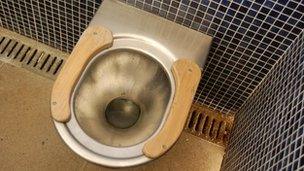Bristol scientists use urine to charge mobile phone
- Published

Scientists have developed a way of charging mobile phones using urine.
Dr Ioannis Ieropoulos, from the Bristol Robotics Laboratory, claimed harnessing power from "the ultimate waste product" was "a world first".
"One product that we can be sure of an unending supply is our own urine," he said.
"By harnessing this power as urine passes through a cascade of microbial fuel cells (MFCs), we have managed to charge a Samsung mobile phone."
The scientists believe the technology has the future potential to be installed in bathrooms to harness the urine and produce sufficient electricity to power showers, lighting or razors as well as mobile phones.
'Smart toilet'
Dr Ieropoulos said: "The beauty of this fuel source is that we are not relying on the erratic nature of the wind or the sun, we are actually re-using waste to create energy.
"So far the microbial fuel power stack that we have developed generates enough power to enable SMS messaging, web browsing and to make a brief phone call.
"Making a call on a mobile phone takes up the most energy, but we will get to the place where we can charge a battery for longer periods.
"The concept has been tested and it works - it's now for us to develop and refine the process so that we can develop MFCs to fully charge a battery."
The MFC is an energy converter which turns organic matter directly into electricity via the metabolism of live micro-organisms.
The electricity is a by-product of the microbes' natural life cycle, so the more they eat things like urine the more energy they generate and for longer periods of time.
Dr Ieropoulos said: "We are currently bidding for funding to work alongside partners in the US and South Africa to develop a smart toilet. Watch this space."
The robotics laboratory is a collaboration between the University of the West of England and the University of Bristol.
- Published19 August 2010